Get the latest financial news, insights and expert analysis from our award-winning MoneyWeek team, to help you understand what really matters when it comes to your finances.
You are now subscribed
Your newsletter sign-up was successful
Want to add more newsletters?

Twice daily
MoneyWeek
Get the latest financial news, insights and expert analysis from our award-winning MoneyWeek team, to help you understand what really matters when it comes to your finances.

Four times a week
Look After My Bills
Sign up to our free money-saving newsletter, filled with the latest news and expert advice to help you find the best tips and deals for managing your bills. Start saving today!
In this week’s magazine we take a look at what investors can learn from the disastrous Deliveroo IPO. We also look at the luxury goods sector – which has proved surprisingly resilient throughout the pandemic and is set for “years of galloping growth”, says Stephen Connolly. He picks some of the best stocks to buy.
Merryn’s on holiday, so this week John has taken over podcast duties. He talks to investor, analyst and author Steve Clapham about many things, but in particular about why you really need to know what you’re doing when you pick individual stocks (and why even if you’re just investing in funds, learning about how to value a company is very useful). Listen to that chat here, and get a discount on Steve’s latest book The Smart Money Method, to boot.
Speaking of funds, this week’s “Too Embarrassed To Ask” video explains what an “ETF” – AKA exchange-traded fund – is. You can watch the video here.
MoneyWeek
Subscribe to MoneyWeek today and get your first six magazine issues absolutely FREE

Sign up to Money Morning
Don't miss the latest investment and personal finances news, market analysis, plus money-saving tips with our free twice-daily newsletter
Don't miss the latest investment and personal finances news, market analysis, plus money-saving tips with our free twice-daily newsletter
Here are the links for this week’s editions of Money Morning and other web stories you may have missed.
- Tuesday Money Morning: Inflationary pressure is building across the globe. But is it here to stay?
- Merryn’s Blog: Deliveroo’s IPO flop shows which way the market is going
- Web article: BP looks set to return more money to shareholders as it beats expectations
- Wednesday Money Morning: Tech has dominated the economy – but the real world is about to strike back
- Web article: What will Joe Biden’s “build back better” plan mean for markets?
- Thursday Money Morning: International tax competition is under threat – which stocks are most vulnerable?
- Web article: Central banks are rushing to build digital currencies. What are they, and what do they mean for you?
- Friday Money Morning: Nuclear power might never be popular – but now looks a good time to invest
- Web article: House prices: from boom to even bigger boom
Now for the charts of the week.
The charts that matter
Gold saw quite the rebound, back to its highest in six weeks or so.
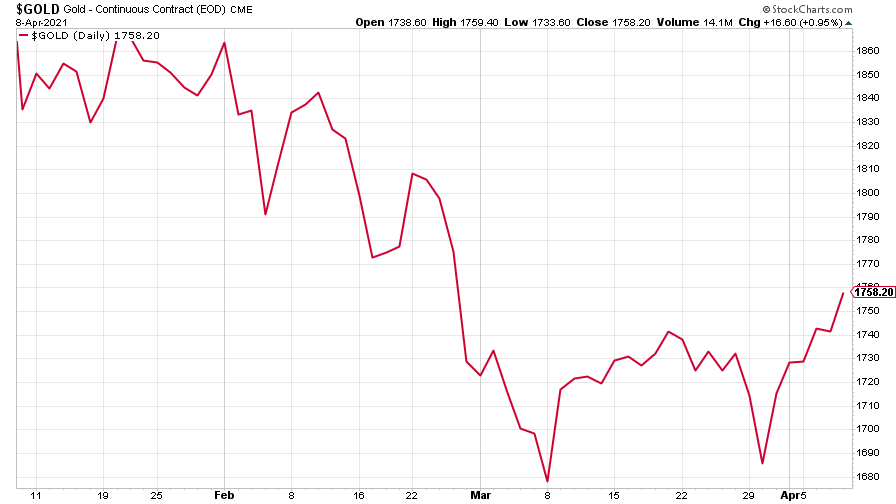
(Gold: three months)
The US dollar index (DXY – a measure of the strength of the dollar against a basket of the currencies of its major trading partners) plunged back down – could Joe Biden’s big spending plan have had an effect?
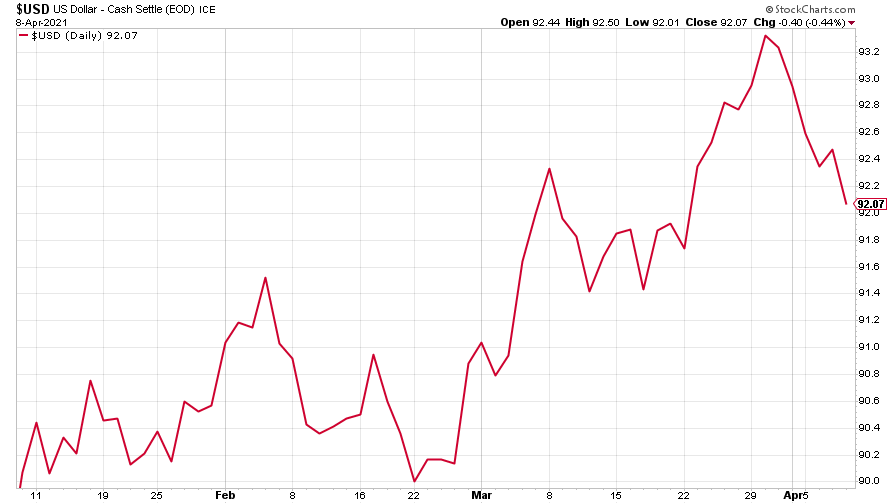
(DXY: three months)
The dollar’s weakness doesn’t seem to have been reflected against the Chinese yuan (or renminbi) however – when the red line is rising, the dollar is strengthening while the yuan is weakening.
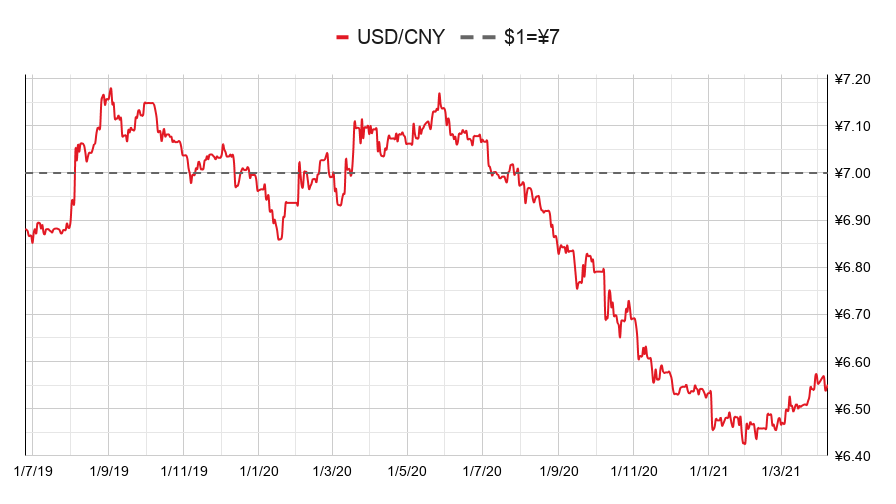
(Chinese yuan to the US dollar: since 25 Jun 2019)
The yield on the ten-year US government bond continued to drift downwards slightly.
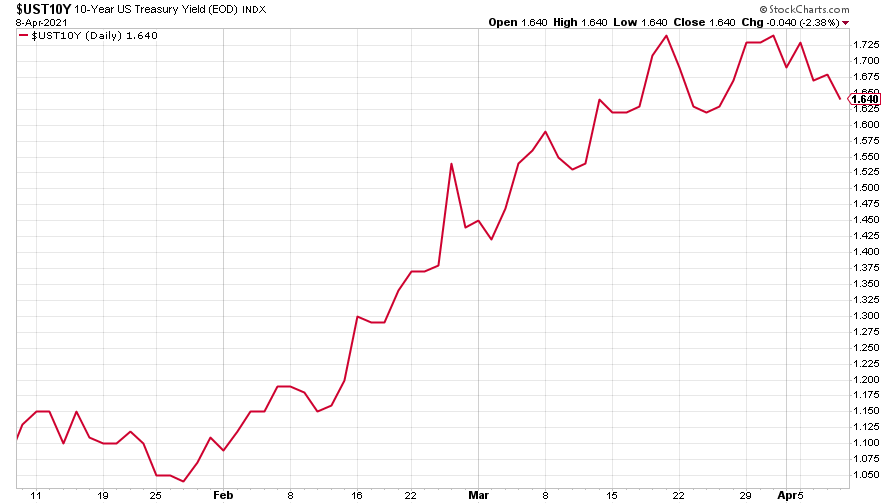
(Ten-year US Treasury yield: three months)
The yield on the Japanese ten-year bond dropped back after the previous week’s big rise.
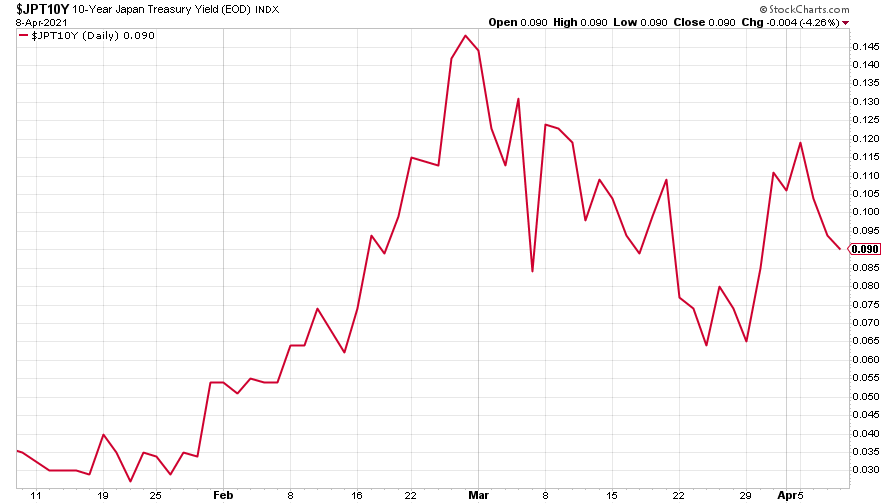
(Ten-year Japanese government bond yield: three months)
And the yield on the ten-year German Bund drifted along in negative territory.
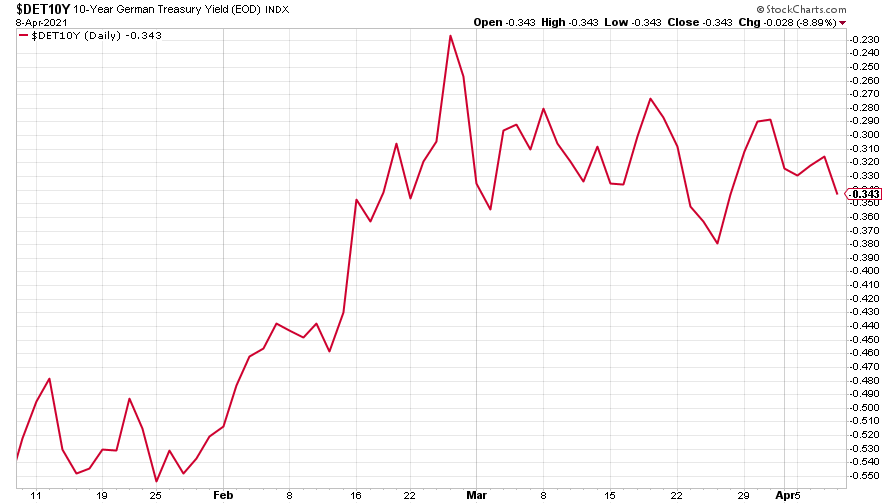
(Ten-year Bund yield: three months)
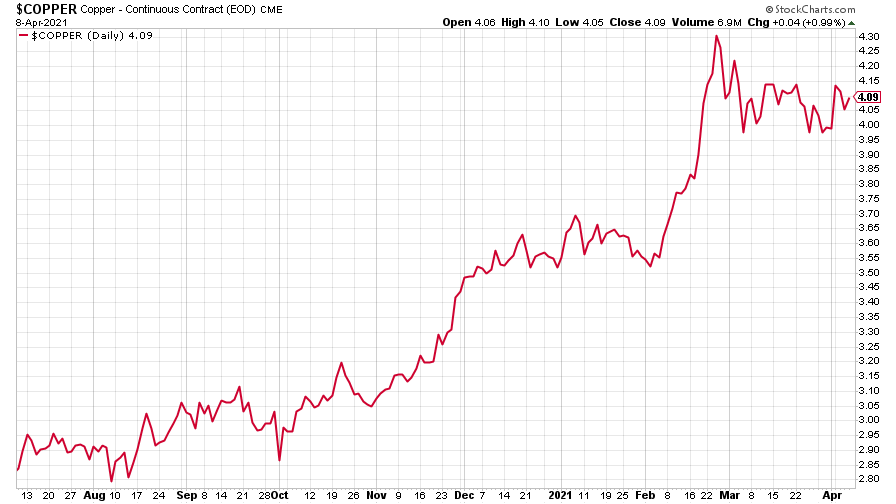
Copper, too, traded in a range.
(Copper: nine months)
And the closely-related Aussie dollar continued to struggle off its three-month low, and remains depressed.
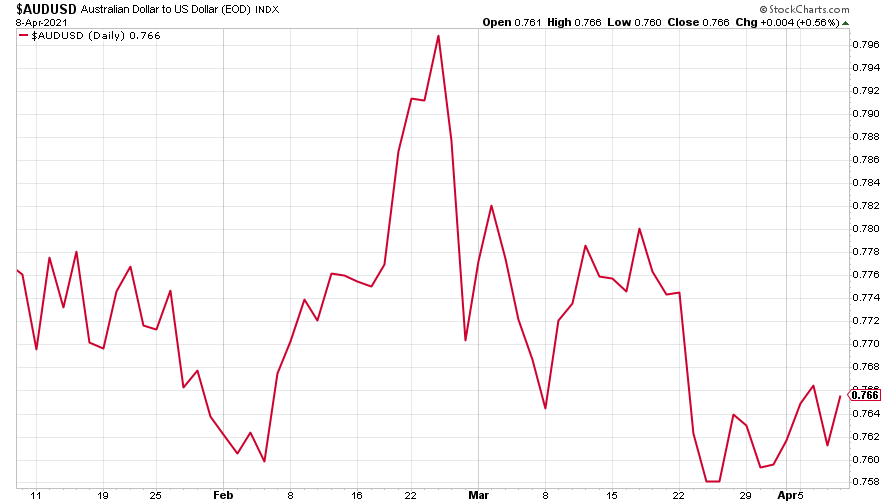
(Aussie dollar vs US dollar exchange rate: three months)
Cryptocurrency bitcoin is biding its time, presumably before it either goes on another wild charge upwards or plummets by 30% or so, giving everyone plenty to talk about.
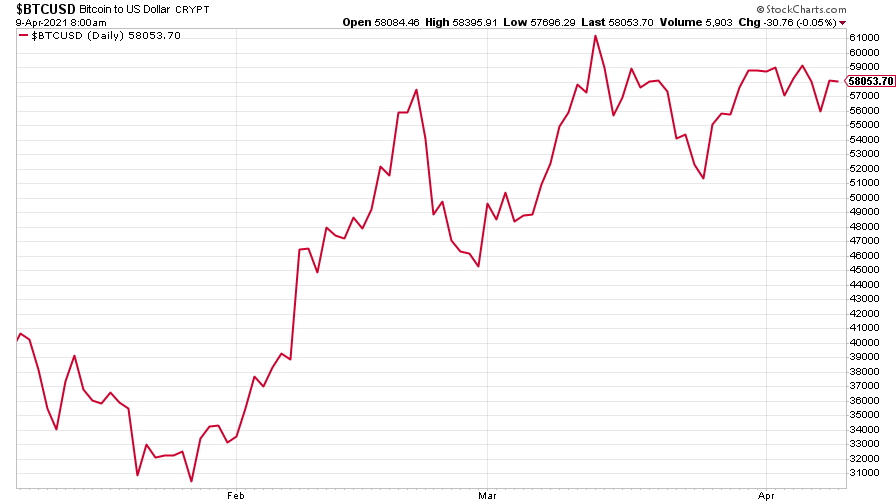
(Bitcoin: three months)
US weekly initial jobless claims rose by 16,000 to 744,000, compared to 728,000 last week (revised up from 719,000). The four-week moving average rose to 723,750, up 2,500 from 721,250 (which was revised up from 719,000) the week before.
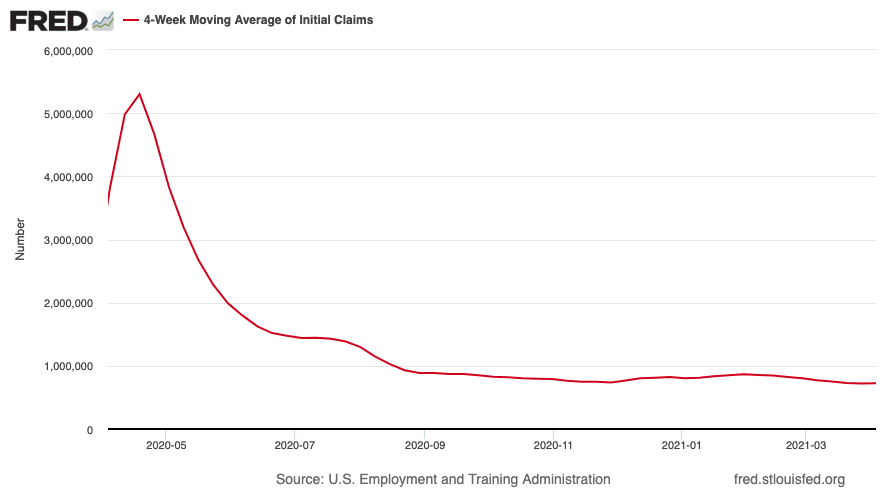
(US initial jobless claims, four-week moving average: since Jan 2020)
The oil price is another one that’s drifting along sideways.
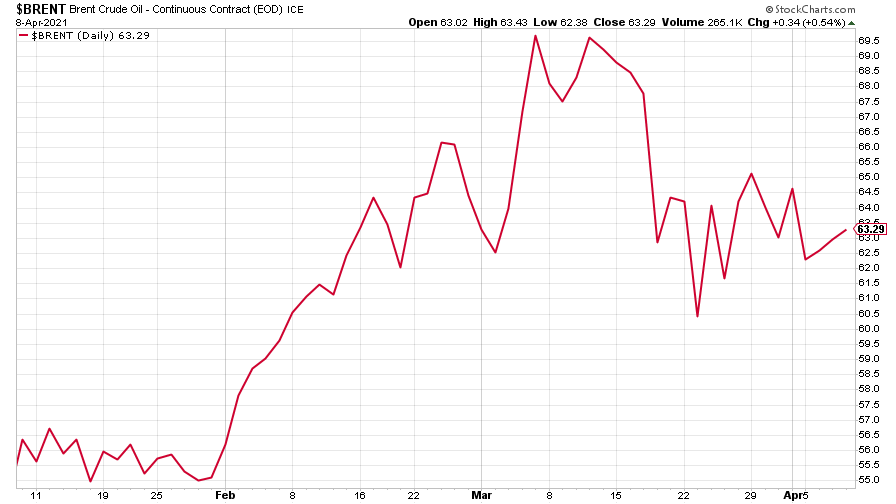
(Brent crude oil: three months)
Amazon, however, was back, at the races.
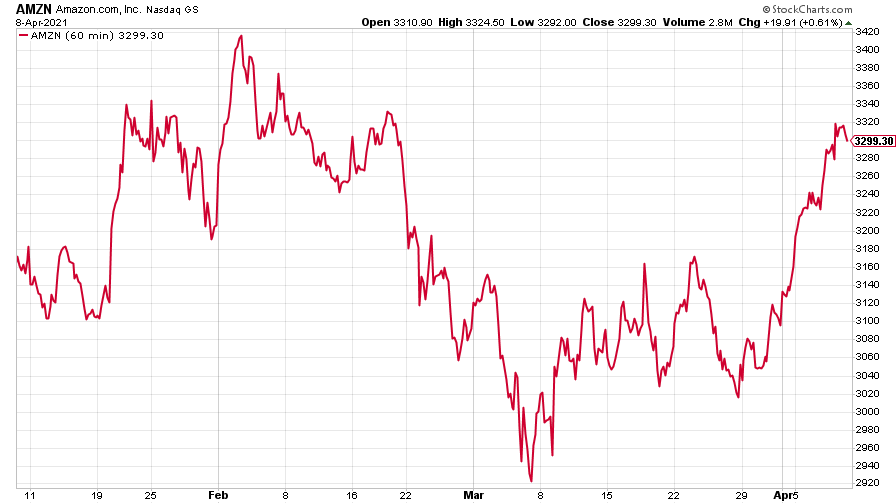
(Amazon: three months)
But Tesla is also sidling along quietly.
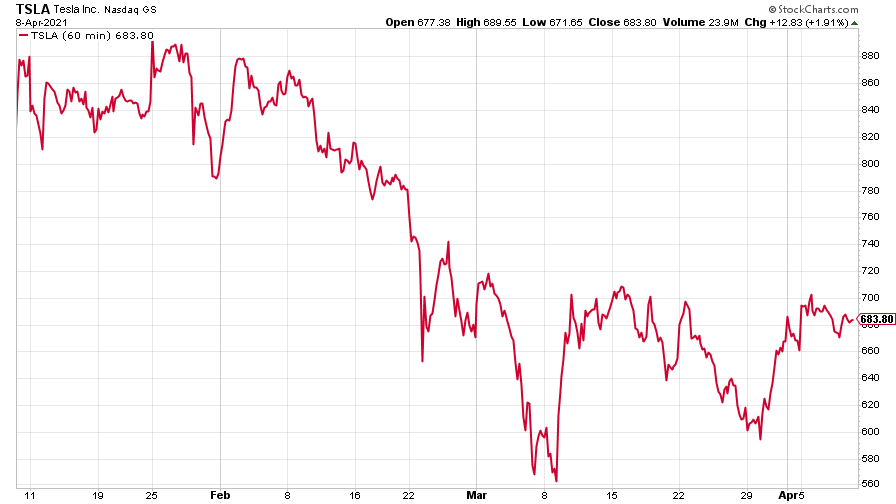
(Tesla: three months)
Have a great weekend.
Get the latest financial news, insights and expert analysis from our award-winning MoneyWeek team, to help you understand what really matters when it comes to your finances.

-
 How a ‘great view’ from your home can boost its value by 35%
How a ‘great view’ from your home can boost its value by 35%A house that comes with a picturesque backdrop could add tens of thousands of pounds to its asking price – but how does each region compare?
-
 What is a care fees annuity and how much does it cost?
What is a care fees annuity and how much does it cost?How we will be cared for in our later years – and how much we are willing to pay for it – are conversations best had as early as possible. One option to cover the cost is a care fees annuity. We look at the pros and cons.
-
 UK wages grow at a record pace
UK wages grow at a record paceThe latest UK wages data will add pressure on the BoE to push interest rates even higher.
-
 Trapped in a time of zombie government
Trapped in a time of zombie governmentIt’s not just companies that are eking out an existence, says Max King. The state is in the twilight zone too.
-
 America is in deep denial over debt
America is in deep denial over debtThe downgrade in America’s credit rating was much criticised by the US government, says Alex Rankine. But was it a long time coming?
-
 UK economy avoids stagnation with surprise growth
UK economy avoids stagnation with surprise growthGross domestic product increased by 0.2% in the second quarter and by 0.5% in June
-
 Bank of England raises interest rates to 5.25%
Bank of England raises interest rates to 5.25%The Bank has hiked rates from 5% to 5.25%, marking the 14th increase in a row. We explain what it means for savers and homeowners - and whether more rate rises are on the horizon
-
 UK inflation remains at 8.7% ‒ what it means for your money
UK inflation remains at 8.7% ‒ what it means for your moneyInflation was unmoved at 8.7% in the 12 months to May. What does this ‘sticky’ rate of inflation mean for your money?
-
 Would a food price cap actually work?
Would a food price cap actually work?Analysis The government is discussing plans to cap the prices of essentials. But could this intervention do more harm than good?
-
 Is my pay keeping up with inflation?
Is my pay keeping up with inflation?Analysis High inflation means take home pay is being eroded in real terms. An online calculator reveals the pay rise you need to match the rising cost of living - and how much worse off you are without it.
